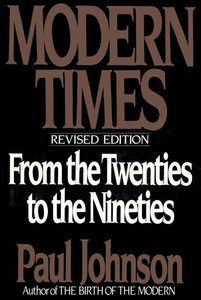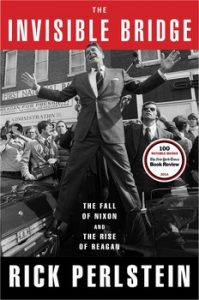Modern Times: The World From the Twenties to the Eighties
Paul Johnson
Review By Dan Geddes
Nearly of all of Paul Johnson’s books now achieve best-seller status in America, thanks largely to the initial success of Modern Times: The World from the Twenties to the Eighties (1983). Instead of model-oriented social science or a pantheon of ruling ideological concepts, Johnson offers us largely a history-as-biography. As readers of history we are fascinated by the chief figures of the twentieth century–Einstein, Lenin, Stalin, Mussolini, Hitler, Churchill, Roosevelt, Mao, Nasser, Adenauer, De Gaulle, Sartre–and Johnson seamlessly weaves elements of their biography into his flowing narrative. In Johnson’s pages we are reminded that history is determined by individuals, and not vice versa as leftist intellectuals–some of the chief villains in Johnson’s work–fervently believed before and after their seizure of power in so many countries.
Indeed, one of the many ideological shibboleths absent from Johnson’s book is the sterile objectivity that precludes historical value judgments. Right or wrong, Johnson takes stands. During his narrative he argues compelling in favor of free markets, the rule of law, governmental non-interference, and at least some moral absolutes. He inveighs against moral relativism, leftist intellectuals, the rise of the professional politician and the concomitant rise of political violence and war. He attacks what he perceives to be the historical myths surrounding the Russian Revolution, the Treaty of Versailles, Stalin’s rise to power, the supposed ineptitude of Presidents Harding and Coolidge, the Stock Market Crash, the novelty of the New Deal, the Bonus Army debacle, the rise of Hitler, and many others. Johnson, as he explicitly stated in his first book, A History of the English People, believes that the positive heuristic impact of new perspectives is more beneficial than restating the conventional wisdom. Fresh insight and interpretation characterize his treatment of nearly all events. Often his conclusions startle us, and often we reject them; but he still manages to widen our perspective and help us challenge the received opinion of academic historians.
The work begins with the sentence: “The modern word began on 29 May 1919 when photographs of a solar eclipse, taken on the island of Principe off West Africa and at Sobral in Brazil, confirmed the truth of a new theory of the universe.” So we see that Johnson feels some responsibility to support his title with not so much a definition as an explanation of “modern.” (His view set forth in chapter one “A Relativistic World” seems vitiated by the fact that his later work Birth of the Modern locates the beginning of modern times in the period 1815-30.) 1917 saw experimental proof of Einstein’s theory of relativity, the shattering of much of old Europe as the Great War reached its peak and America entered European affairs mightily, and perhaps most importantly, the Russian Revolution ushered in an age of political anarchy. Although largely Eurocentric and concerned with traditional political history, Modern Times also treats intellectual developments as crucial to the formation of the age. The twentieth century was to a great degree shaped by what Johnson terms the “trio of [great] German thinkers”–Freud, Marx, Nietzsche, whose collective influence took off during the early twentieth century. The popularization of Freud’s work was largely a by-product of the Great War when “shell-shock” prompted a new receptiveness to psychoanalysis. Nietzsche became a decisive influence on writers, artists, and intellectuals in the early twentieth century. And although Marx’s philosophy was well known even in the middle nineteenth century, without the Bolshevik revolution, Marx’s place in history might be closer to the likes of Saint-Simon and other socialist thinkers whose impact on events was minimal. Lenin was the instrument whereby Marx had become arguably the most influential philosopher of all time.
Lenin’s was the first modern European regime lacking all respect for the rule of law; following Marxist dogma, History was the engine of human affairs, and mere individuals, despite being armed with bourgeois “rights,” were not to stand in the way of their inevitable rise to power. For Johnson, Lenin is the chief catalyst for the horrors of the twentieth century. The Russian Revolution signified the beginning of the end of the rule of law for so much of the world, and inaugurated the time when “the political politician would inherit the earth.” Lenin served as a model for most of the later dictators that followed in his stead, and without his initial success to guide them (and the resources of the Soviet Union devoted to “permanent revolution”) it is doubtful that so many of these tyrants would have seized power. And having seized power, these tyrants–Mussolini, Pol Pot, Hitler, Stalin, Mao, the Shah of Iran–copied Lenin’s experiments in social engineering: shoveling around individuals like concrete for the sake of some ostensibly higher aim–all while masking the dictator’s drive for perpetuation of his power. Enjoying his vantage point of historical hindsight, Johnson gleefully catalogs the naive reception that so many left-wing intellectuals–especially British and American–gave to the rise of the Bolshevik state, and the role they played in whitewashing the world’s view of the Soviet “miracle.”
Johnson also identifies the similarity of the totalitarian regimes of the 1930s, especially in regards to their essentially Marxist orientation, i.e., viewing society in terms of classes (or races in the case of Hitler) rather than individuals. Almost none of the major dictators had ever been involved in the process of wealth creation, and few had ever thought of entering any other occupation other than that of the professional politician. Following Nietzsche’s “will to power,” they represented the transference of the religious impulse into poltics.
These themes, then, weave their way through all of Johnson’s narrative. The twentieth century is depicted as a time when the pressures of war and the ideas of intellectuals fueled an unprecedented rise in state power, especially vis-a-vis the individual. This tide of state power has still not receded. Compounding the already deplorable erosion of civil liberties engendered by the growth of the state is decline in economic productivity–throughout the non-Western world. Russia, a huge food exporter under the Tsars, became a food importer after agricultural collectivation. Oddly enough much of the “Third World” followed Russia’s example of collectivism and suffered disastrous declines in agricultural productivity. Yet even the Western democracies witnessed a large growth in the role of the state, as wartime bureaucracies proved resistant to dismantling.
The West could not remain immune to the moral relativism of the totalitarian regimes. Johnson quotes a prophetic statement by Churchill during World War I describing how the war of attrition waged by the totalitarian regimes forced the West to lower its own moral standards. Indeed Britain, lacking other means to attack Germany, was the first of the powers to initiate large scale bombings against civilians. These continued, indeed increased, even after the entry of America and Russia into the battle against Germany.; the bombing program had gained a momentum of its own.
In contrast to the stilted, stultifying prose of too many academic historians, Johnson offers us a feast of strong sentences, honest characterizations, and a unifying thesis–one that never intrudes upon his depiction of events even if those events do not always support his thesis. The Modern Age is the time of moral relativism; the most hopeful trend in the eighties and nineties is the continued strength of religion, which hopefully can reteach humanity moral principles and so avert so much political violence. Whatever one thinks of Johnson’s “conservative” views, one must respect his scholarship and insight.











Be First to Comment